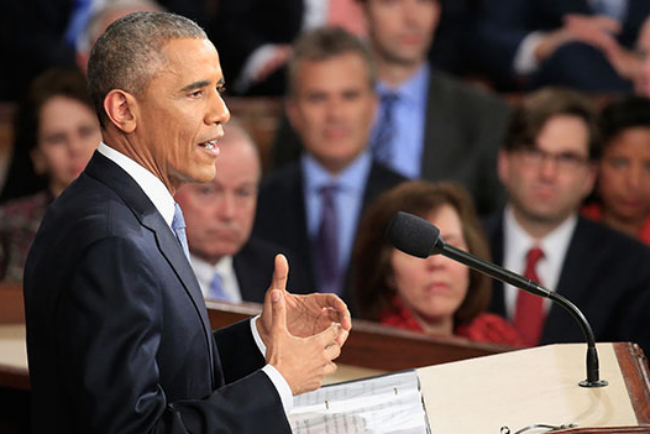
The address attracted 2,596,000 tweets sent from 642,000 different Twitter accounts seen 276,516,000 times. The Twitter audience, or total number of Twitter accounts that saw at least one tweet about the SOTU, was at an astounding 9,780,000, making it the biggest of the eight SOTU addresses Obama has brought into America’s homes.
I’m treating this last State of the Union just like my first – because I’m still just as hungry. I hope you tune in, because it’s for you.
— President Obama (@POTUS) January 13, 2016
Twitter data for Obama’s SOTU addresses only dates back to 2012, but the pattern of its progression indicates the last four years have been the peak. President Obama’s 2012 SOTU attracted 766,681 tweets. The following year, the activity nearly doubled to 1.36 million. None of the next three SOTU addresses generated less than two million tweets.
The SOTU is only as popular as the man at the podium and Obama has become a rock star on Twitter. Between November 2012 and March 2015, the number of people following President Obama’s official Twitter account more than doubled from 23.63 million to 56.93 million, according to Statista.
It is an illusive gift to leave at the top of your game and last night’s SOTU address marked the start of a decline. The SOTU drew 17.7 million viewers across broadcast television, a nine percent drop from last year’s SOTU. The address added 14 million more viewers from cable, bringing its final total to 31.7 million, the lowest for the State of the Union in 15 years. Still, 31.7 million people watching you crack jokes and flaunt your resumé is a pretty good way to leave a job, and that doesn’t include online ways to watch, like YouTube. Counting up streams from a few major sources, more than 1.2 million people viewed the speech that way, as well. Likely many more.
Here are some of most popular tweets about President Obama’s final SOTU address:
.@POTUS is right: Progress isn’t inevitable. We have a choice between pushing forward—or undoing all the work we’ve done. #SOTU
— Hillary Clinton (@HillaryClinton) January 13, 2016
Middle-class income has declined $2,000 under Obama’s failed policies. That’s not progress. That’s not giving everyone a fair shot. #SOTU
— Jeb Bush (@JebBush) January 13, 2016
The State Of The Union speech was one of the most boring, rambling and non-substantive I have heard in a long time. New leadership fast!
— Donald J. Trump (@realDonaldTrump) January 13, 2016
.@POTUS and @FLOTUS knocked it out of the park tonight at #SOTU16. A+++ pic.twitter.com/OfMNuYQLNw
— Coach Harbaugh (@CoachJim4UM) January 13, 2016
Me trying to watch #SOTU16 without thinking about drones and ICE Raids. pic.twitter.com/32HmR5zWsZ
— TariqTouré طارق تورى (@TariqToure) January 13, 2016
Editors' Recommendations
- Australia threatens Twitter with huge fines over hate speech
- State of the Union: Trump reaffirms desire to see U.S. put a flag on Mars
- Twitter now lets you play hide-and-seek with unwanted replies, but will it last?
